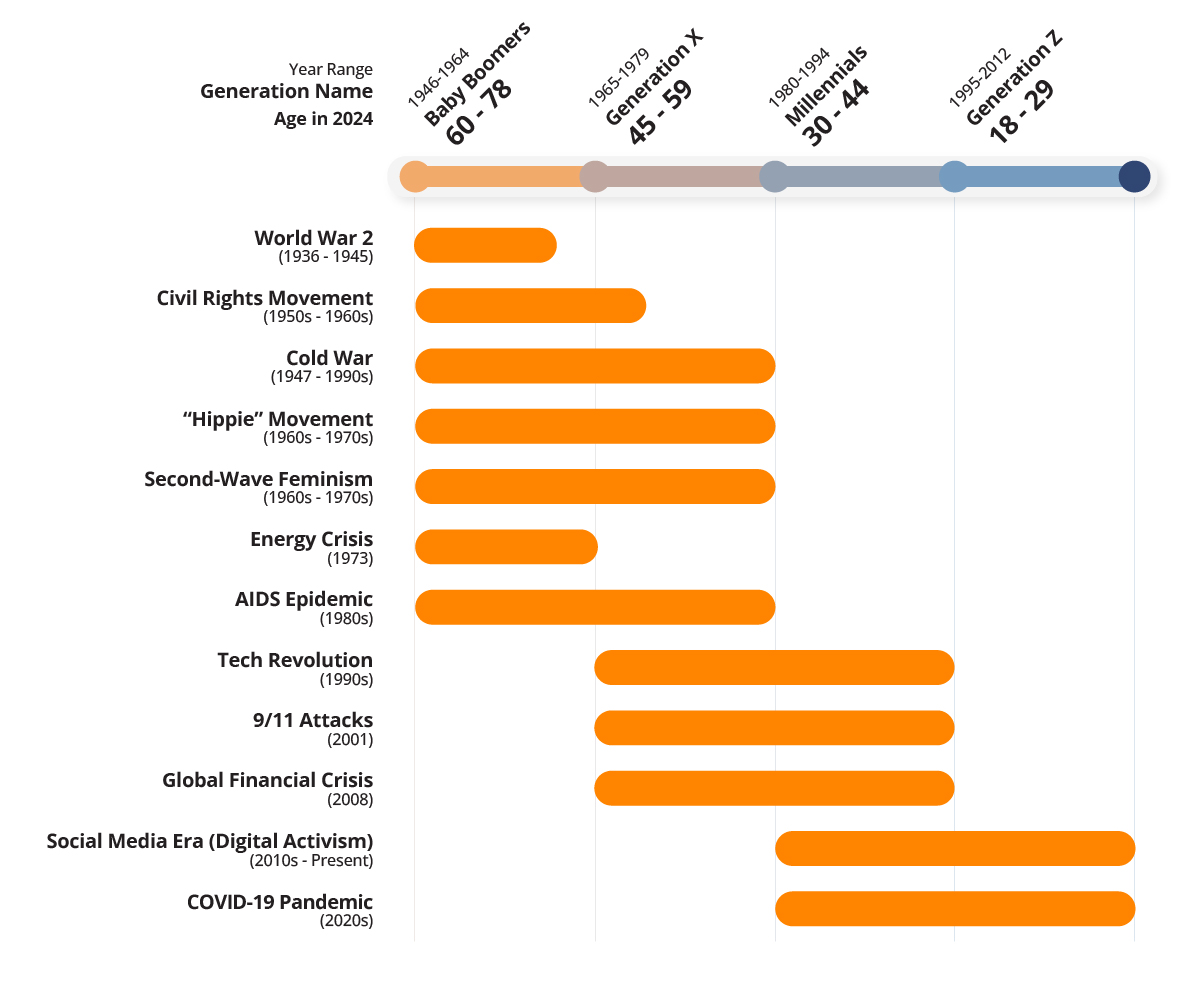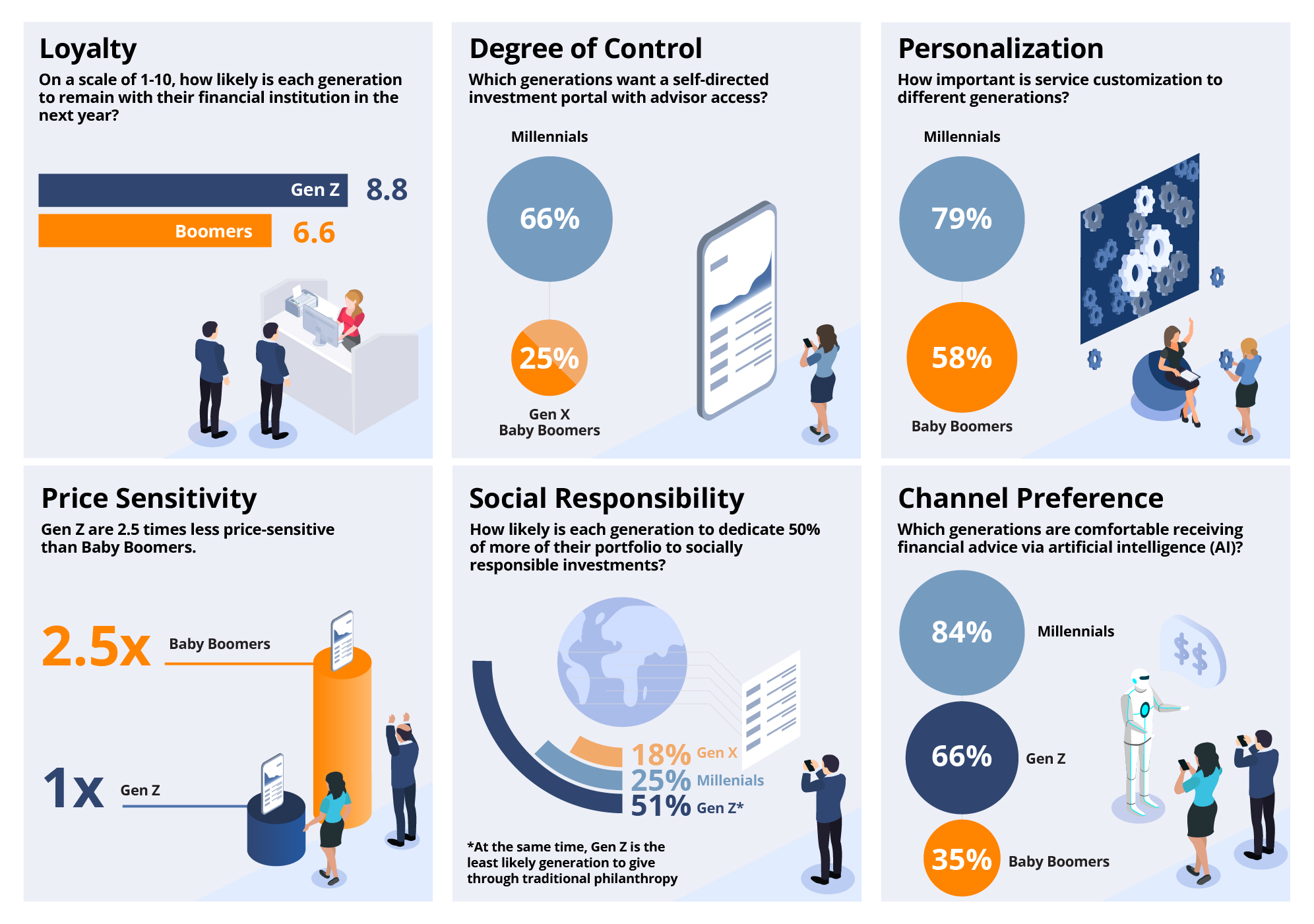
In an economic climate that is defined by rapid technological innovation, increasing inequalities, and unpredictable challenges, the way people seek out advice and how this reflects in the way they make decisions is changing. As different generations navigate their own distinct needs tied to their life stage, their approach to financial decision-making varies significantly and is influenced by the events and forces which impacted the shaping of their respective values. This has a trickle-down effect into their purchasing decisions and interactions within advice-driven service providers, where they rely on expert advice to help guide their ultimate financial decisions.
Advice-Driven Services:
Sectors where consumers seek expert guidance for significant financial decisions (e.g., Insurance, Banking, Wealth Management, Real Estate)
Defining Generational Cohorts
Over time, historical events and movements that have occurred during the formative years of a generation (when they are age 25 and under), have influenced their values, behaviours, and preferences.

What Matters Most to Each Cohort?
Various historical events and movements, and their accompanying social narrative, are core to shaping the value systems of individuals who live in these periods. While it would be naïve to state these events shape the values of all in a generational cohort in the same way, this is what we found to be true for the majority in each cohort1,2,3:
Baby Boomers:
- Stability: Value stability in careers and engage with brands that promise reliability
- Personal Growth: Place high value on self-improvement as the first generation to have broader access to education
- Loyalty: Known for having a strong work ethic and commitment to career growth often with one company
Generation X:
- Self-Reliance: Value independence and control, they tend to be skeptical of authority
- Pragmatism: Tend to value practical solutions and straightforward communication
- Adaptability: Having been most impacted by the shift from a predominantly analog world to a digital one, they are flexible and resourceful
Millennials:
- Experiences over Possessions: Value travel and personal growth over material possessions
- Technology Savvy: Comfortable with the digital world and technological advancements
- Social Responsibility: Strong sense of community and societal responsibility
Generation Z:
- Transparency: Highly value authenticity and corporate transparency
- Security: Tend to be more cautious and concerned about their future
- Digital Natives: Even more than Millennials, the first generation to be born with personal technology available to them use digital tools as their primary communication method
The values and priorities of different generations affect various areas important to advice-driven service providers. These preferences should be considered when designing experiences to attract and engage specific target segments.

Investing in Understanding Target Customer Needs and Drivers:
While there has been change and transformation in advice-driven services, these sectors have not been subject to the same degree of disruption as other industries. Advice-driven services are still largely driven by the personal relationship created between an expert and their customer, with pressure mounting on the advisor relationship as younger generations demonstrate different needs and priorities compared to their predecessors.
This high-level view of the preferences of each generation merely scratches the surface on how to think about designing customer-centric service experiences. It would be near-sighted to paint all within a generation by the same brush, as evolving preferences impact the decisions you see your customers making every day. To stay ahead, advice-based services must take a data-driven approach to define their target audiences, understand their needs and preferences, and design their experiences to deliver on what matters most to these customers.
Connect with our team to learn how effectively your organization is delivering on the principles of customer centricity to inform your growth strategies today, and how you can better serve a multigenerational audience tomorrow.
1 Growertalks [2023] – https://www.growertalks.com/Article/?articleid=26482
2 Humanoo [2024] – https://humanoo.com/en/magazin/boomers-to-gen-z-diverse-workforce/
3 TechTarget [2024] – https://www.techtarget.com/whatis/feature/Generational-values-in-the-workplace-explained
4 BAI [2023] –
https://thefinancialbrand.com/news/gen-z-banking/is-gen-z-the-answer-to-bankings-struggle-with-acquiring-new-customers-159447/
5 Publicis Sapient [2024] – https://www.publicissapient.com/industries/financial-services/digital-wealth#report
6 Raconteur [2019] – https://www.raconteur.net/finance/how-millennials-invest
7 Phase 5 [2023] – https://www.phase-5.com/insights/gen-z-banking-insights-part-two-using-technology-to-improve-service
8 Business Wire [2021] – https://www.businesswire.com/news/home/20210526005143/en/Capco-Study-72-of-Customers-Rate-Personalization-as-%E2%80%9CHighly-Important%E2%80%9D-in-Today%E2%80%99s-Financial-Services-Landscape
9 Morning Consult Economic Intelligence [2023] – https://pro.morningconsult.com/analysis/inflation-price-pressures-november-2023
10 CanadaHelps [2024] – https://indd.adobe.com/view/763060b8-d8a0-48c9-8325-c9e619340e9a
11 BAI [2021] – https://www.bai.org/wp-content/uploads/2021/04/banking-attitudes-generation-by-generation.pdf
12 Marketwatch [2024] – https://www.marketwatch.com/guides/banking/generational-banking-survey/




